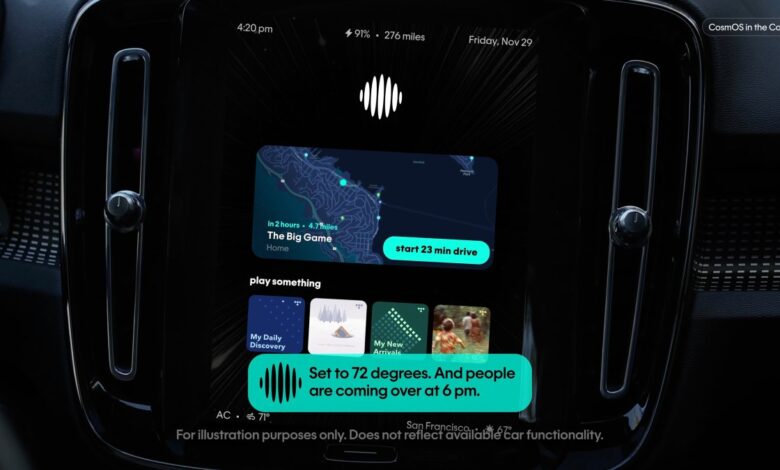Ai Pin maker Humane demonstrates AI software for cars, phones and smart speakers

When Human launched his Ai PinThe San Francisco-based device maker envisioned a world with dedicated AI devices, something you’d carry with you in addition to the smartphone in your pocket.
However, reviews and sales have not been very good; Returns reportedly began to increase. leave behind unit sales at a given time. And human recently abandonment the price of your device from $700 to $500. While the AI device is still on sale, it’s unclear what’s next for the company, which is at least not lacking in funding (to the tune of more than $230 million).
Now, Humane is launching something new: an operating system called CosmoOS that could (potentially) greatly improve all the tech devices in your life. in a nifty demo videoThe company showed off the operating system running on a car entertainment system, a smart speaker, a TV, and an Android phone.
In many ways, CosmoOS hints at what Amazon’s Alexa, Google Assistant, or Apple’s Siri could become if combined with AI agent-like capabilities. It is a voice assistant that can understand complex queries and interact with other apps and services on your behalf.
Humane says CosmoOS is based on the operating system that powers its Ai Pin. “This intelligent driver seamlessly coordinates multiple AI models, data sets, services and device capabilities to deliver a seamless and intuitive experience,” the company said in the video.
In your first example, the person in the video talks to CosmoS in their car and asks the assistant to turn up the heat in their house. In the same query, they also want to know when people will come tonight.
We’re also instantly reminded that Humane once again presents a vision rather than a product: the logo on the steering wheel is blurred and there’s a note saying it’s “for illustrative purposes only.” “It does not reflect the available functionality of the car.”
Other use case examples in the video include asking for takeout restaurant recommendations, asking for a recipe that the user already reviewed the day before, and asking a question about a sports game. The smart speaker used in the video is also blurry.
In television, Humane presents a multi-modal, multi-step use case. For example, you could ask how many goals a soccer player has scored this season. The AI assistant is supposed to understand who you’re talking about based on the player on the screen and then answer your original question.
As for smartphone integration, the demo reminds me of Apple’s speech for a better Siri powered by Apple Intelligence at WWDC earlier this year. In Humane’s case, CosmoS understands what’s on your screen and can interact with your calendar in the background.
Humane says third-party developers will be able to create integrations between CosmOS and its “agents, data, and services.” In reality, the demo video seems more like a sales pitch: to see if there are any companies that would be interested in acquiring Humane and reusing Humane’s software in their own products.
Personal opinion:
“Humane’s demonstration of its cutting-edge AI technologies for cars, smartphones, and speakers is a great move. If Humane can deliver a unique user experience with its devices, it could further the integration of technology into everyday life. However, the company will struggle to deliver real value in a highly competitive market. I believe that focusing on ease of use and privacy will be key to making a long-term impact.”
